Organisational Behaviour Report: Tesco - Team and Individual Behavior
VerifiedAdded on 2020/10/22
|18
|6225
|147
Report
AI Summary
This report provides a comprehensive analysis of organizational behaviour within Tesco, examining the influence of culture, politics, and power on individual and team performance. It utilizes Handy's culture typology to dissect Tesco's organizational structure, exploring power, role, task, and person cultures. The report delves into motivational theories, including content theories like Maslow's hierarchy of needs, to understand how Tesco motivates its workforce. It also contrasts effective and ineffective team dynamics, referencing Tuckman's team building model and Belbin's roles typology to support the development of dynamic cooperation. Furthermore, the report discusses the concepts and philosophies of organizational behaviour within Tesco, considering various situations and their impact on employee conduct. Overall, the report offers insights into how Tesco manages its organizational behaviour to achieve its goals.
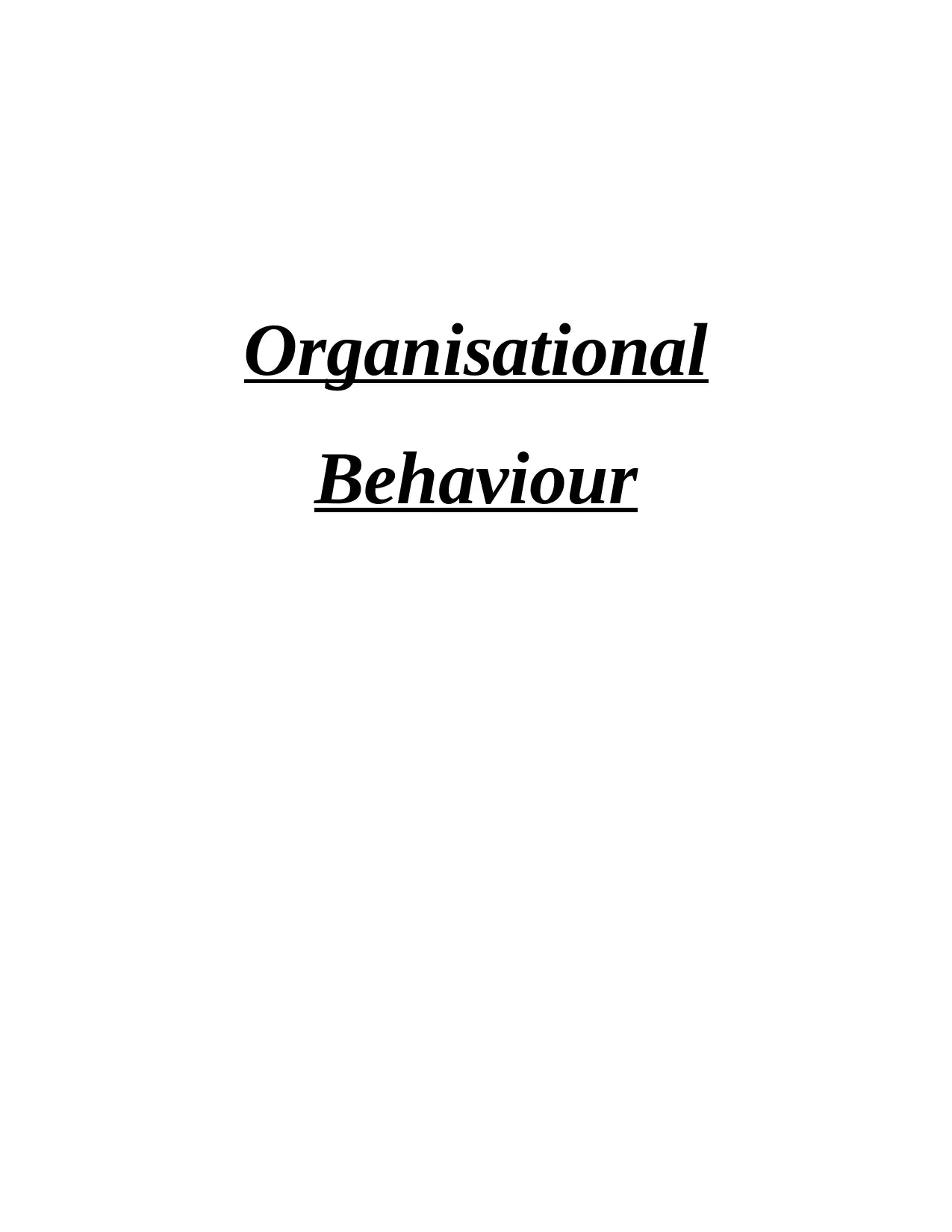
Organisational
Behaviour
Behaviour
Paraphrase This Document
Need a fresh take? Get an instant paraphrase of this document with our AI Paraphraser
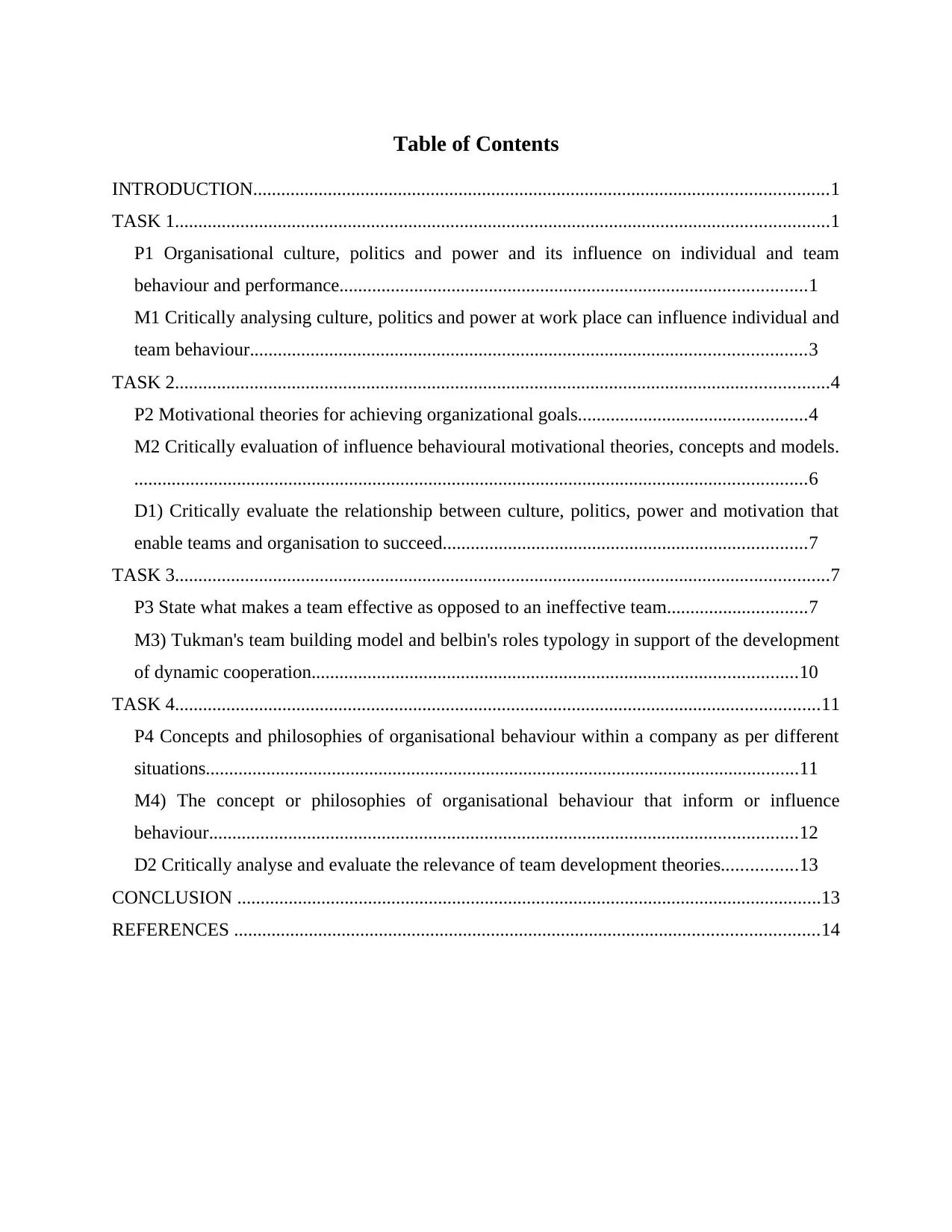
Table of Contents
INTRODUCTION...........................................................................................................................1
TASK 1............................................................................................................................................1
P1 Organisational culture, politics and power and its influence on individual and team
behaviour and performance....................................................................................................1
M1 Critically analysing culture, politics and power at work place can influence individual and
team behaviour.......................................................................................................................3
TASK 2............................................................................................................................................4
P2 Motivational theories for achieving organizational goals.................................................4
M2 Critically evaluation of influence behavioural motivational theories, concepts and models.
................................................................................................................................................6
D1) Critically evaluate the relationship between culture, politics, power and motivation that
enable teams and organisation to succeed..............................................................................7
TASK 3............................................................................................................................................7
P3 State what makes a team effective as opposed to an ineffective team..............................7
M3) Tukman's team building model and belbin's roles typology in support of the development
of dynamic cooperation........................................................................................................10
TASK 4..........................................................................................................................................11
P4 Concepts and philosophies of organisational behaviour within a company as per different
situations...............................................................................................................................11
M4) The concept or philosophies of organisational behaviour that inform or influence
behaviour..............................................................................................................................12
D2 Critically analyse and evaluate the relevance of team development theories................13
CONCLUSION .............................................................................................................................13
REFERENCES .............................................................................................................................14
INTRODUCTION...........................................................................................................................1
TASK 1............................................................................................................................................1
P1 Organisational culture, politics and power and its influence on individual and team
behaviour and performance....................................................................................................1
M1 Critically analysing culture, politics and power at work place can influence individual and
team behaviour.......................................................................................................................3
TASK 2............................................................................................................................................4
P2 Motivational theories for achieving organizational goals.................................................4
M2 Critically evaluation of influence behavioural motivational theories, concepts and models.
................................................................................................................................................6
D1) Critically evaluate the relationship between culture, politics, power and motivation that
enable teams and organisation to succeed..............................................................................7
TASK 3............................................................................................................................................7
P3 State what makes a team effective as opposed to an ineffective team..............................7
M3) Tukman's team building model and belbin's roles typology in support of the development
of dynamic cooperation........................................................................................................10
TASK 4..........................................................................................................................................11
P4 Concepts and philosophies of organisational behaviour within a company as per different
situations...............................................................................................................................11
M4) The concept or philosophies of organisational behaviour that inform or influence
behaviour..............................................................................................................................12
D2 Critically analyse and evaluate the relevance of team development theories................13
CONCLUSION .............................................................................................................................13
REFERENCES .............................................................................................................................14

⊘ This is a preview!⊘
Do you want full access?
Subscribe today to unlock all pages.

Trusted by 1+ million students worldwide
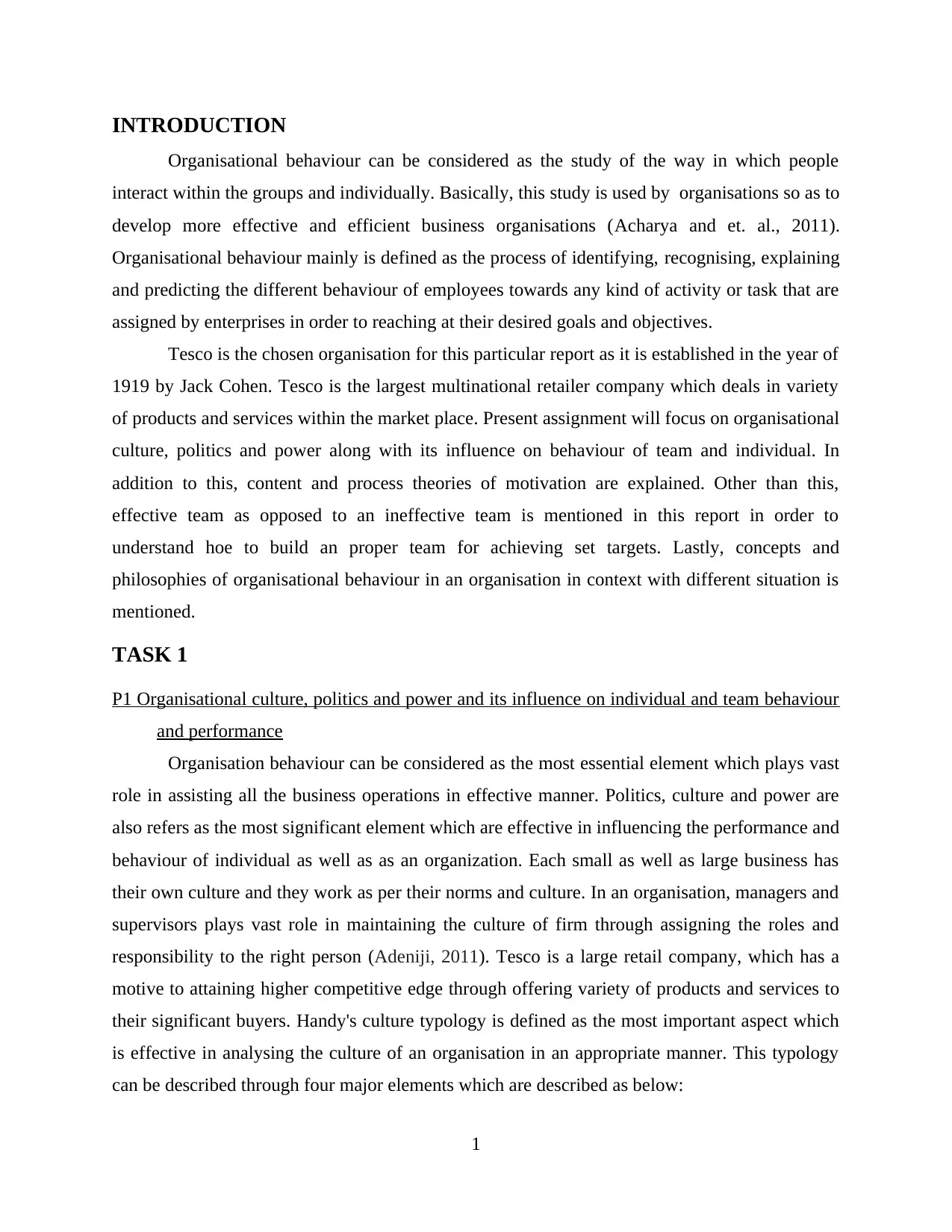
INTRODUCTION
Organisational behaviour can be considered as the study of the way in which people
interact within the groups and individually. Basically, this study is used by organisations so as to
develop more effective and efficient business organisations (Acharya and et. al., 2011).
Organisational behaviour mainly is defined as the process of identifying, recognising, explaining
and predicting the different behaviour of employees towards any kind of activity or task that are
assigned by enterprises in order to reaching at their desired goals and objectives.
Tesco is the chosen organisation for this particular report as it is established in the year of
1919 by Jack Cohen. Tesco is the largest multinational retailer company which deals in variety
of products and services within the market place. Present assignment will focus on organisational
culture, politics and power along with its influence on behaviour of team and individual. In
addition to this, content and process theories of motivation are explained. Other than this,
effective team as opposed to an ineffective team is mentioned in this report in order to
understand hoe to build an proper team for achieving set targets. Lastly, concepts and
philosophies of organisational behaviour in an organisation in context with different situation is
mentioned.
TASK 1
P1 Organisational culture, politics and power and its influence on individual and team behaviour
and performance
Organisation behaviour can be considered as the most essential element which plays vast
role in assisting all the business operations in effective manner. Politics, culture and power are
also refers as the most significant element which are effective in influencing the performance and
behaviour of individual as well as as an organization. Each small as well as large business has
their own culture and they work as per their norms and culture. In an organisation, managers and
supervisors plays vast role in maintaining the culture of firm through assigning the roles and
responsibility to the right person (Adeniji, 2011). Tesco is a large retail company, which has a
motive to attaining higher competitive edge through offering variety of products and services to
their significant buyers. Handy's culture typology is defined as the most important aspect which
is effective in analysing the culture of an organisation in an appropriate manner. This typology
can be described through four major elements which are described as below:
1
Organisational behaviour can be considered as the study of the way in which people
interact within the groups and individually. Basically, this study is used by organisations so as to
develop more effective and efficient business organisations (Acharya and et. al., 2011).
Organisational behaviour mainly is defined as the process of identifying, recognising, explaining
and predicting the different behaviour of employees towards any kind of activity or task that are
assigned by enterprises in order to reaching at their desired goals and objectives.
Tesco is the chosen organisation for this particular report as it is established in the year of
1919 by Jack Cohen. Tesco is the largest multinational retailer company which deals in variety
of products and services within the market place. Present assignment will focus on organisational
culture, politics and power along with its influence on behaviour of team and individual. In
addition to this, content and process theories of motivation are explained. Other than this,
effective team as opposed to an ineffective team is mentioned in this report in order to
understand hoe to build an proper team for achieving set targets. Lastly, concepts and
philosophies of organisational behaviour in an organisation in context with different situation is
mentioned.
TASK 1
P1 Organisational culture, politics and power and its influence on individual and team behaviour
and performance
Organisation behaviour can be considered as the most essential element which plays vast
role in assisting all the business operations in effective manner. Politics, culture and power are
also refers as the most significant element which are effective in influencing the performance and
behaviour of individual as well as as an organization. Each small as well as large business has
their own culture and they work as per their norms and culture. In an organisation, managers and
supervisors plays vast role in maintaining the culture of firm through assigning the roles and
responsibility to the right person (Adeniji, 2011). Tesco is a large retail company, which has a
motive to attaining higher competitive edge through offering variety of products and services to
their significant buyers. Handy's culture typology is defined as the most important aspect which
is effective in analysing the culture of an organisation in an appropriate manner. This typology
can be described through four major elements which are described as below:
1
Paraphrase This Document
Need a fresh take? Get an instant paraphrase of this document with our AI Paraphraser
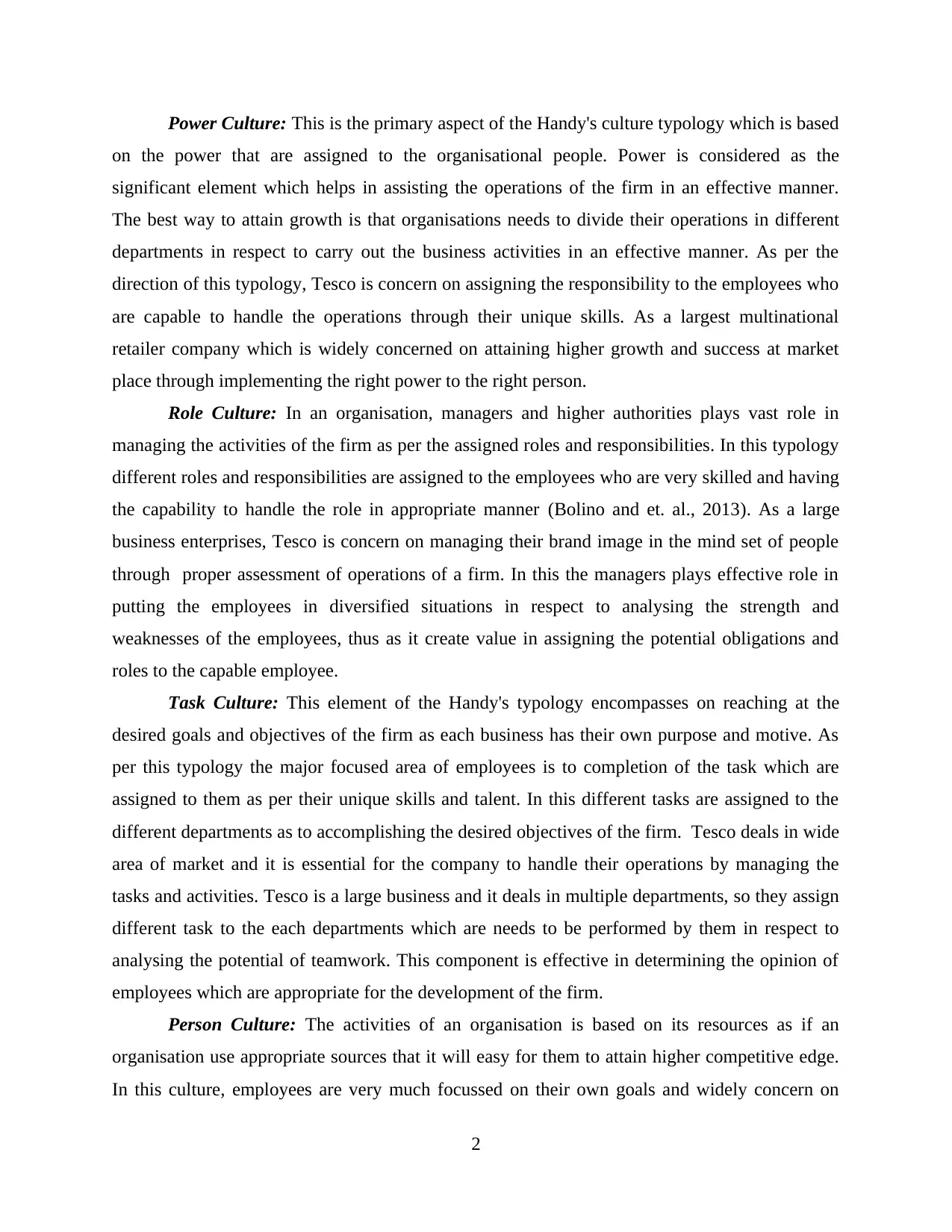
Power Culture: This is the primary aspect of the Handy's culture typology which is based
on the power that are assigned to the organisational people. Power is considered as the
significant element which helps in assisting the operations of the firm in an effective manner.
The best way to attain growth is that organisations needs to divide their operations in different
departments in respect to carry out the business activities in an effective manner. As per the
direction of this typology, Tesco is concern on assigning the responsibility to the employees who
are capable to handle the operations through their unique skills. As a largest multinational
retailer company which is widely concerned on attaining higher growth and success at market
place through implementing the right power to the right person.
Role Culture: In an organisation, managers and higher authorities plays vast role in
managing the activities of the firm as per the assigned roles and responsibilities. In this typology
different roles and responsibilities are assigned to the employees who are very skilled and having
the capability to handle the role in appropriate manner (Bolino and et. al., 2013). As a large
business enterprises, Tesco is concern on managing their brand image in the mind set of people
through proper assessment of operations of a firm. In this the managers plays effective role in
putting the employees in diversified situations in respect to analysing the strength and
weaknesses of the employees, thus as it create value in assigning the potential obligations and
roles to the capable employee.
Task Culture: This element of the Handy's typology encompasses on reaching at the
desired goals and objectives of the firm as each business has their own purpose and motive. As
per this typology the major focused area of employees is to completion of the task which are
assigned to them as per their unique skills and talent. In this different tasks are assigned to the
different departments as to accomplishing the desired objectives of the firm. Tesco deals in wide
area of market and it is essential for the company to handle their operations by managing the
tasks and activities. Tesco is a large business and it deals in multiple departments, so they assign
different task to the each departments which are needs to be performed by them in respect to
analysing the potential of teamwork. This component is effective in determining the opinion of
employees which are appropriate for the development of the firm.
Person Culture: The activities of an organisation is based on its resources as if an
organisation use appropriate sources that it will easy for them to attain higher competitive edge.
In this culture, employees are very much focussed on their own goals and widely concern on
2
on the power that are assigned to the organisational people. Power is considered as the
significant element which helps in assisting the operations of the firm in an effective manner.
The best way to attain growth is that organisations needs to divide their operations in different
departments in respect to carry out the business activities in an effective manner. As per the
direction of this typology, Tesco is concern on assigning the responsibility to the employees who
are capable to handle the operations through their unique skills. As a largest multinational
retailer company which is widely concerned on attaining higher growth and success at market
place through implementing the right power to the right person.
Role Culture: In an organisation, managers and higher authorities plays vast role in
managing the activities of the firm as per the assigned roles and responsibilities. In this typology
different roles and responsibilities are assigned to the employees who are very skilled and having
the capability to handle the role in appropriate manner (Bolino and et. al., 2013). As a large
business enterprises, Tesco is concern on managing their brand image in the mind set of people
through proper assessment of operations of a firm. In this the managers plays effective role in
putting the employees in diversified situations in respect to analysing the strength and
weaknesses of the employees, thus as it create value in assigning the potential obligations and
roles to the capable employee.
Task Culture: This element of the Handy's typology encompasses on reaching at the
desired goals and objectives of the firm as each business has their own purpose and motive. As
per this typology the major focused area of employees is to completion of the task which are
assigned to them as per their unique skills and talent. In this different tasks are assigned to the
different departments as to accomplishing the desired objectives of the firm. Tesco deals in wide
area of market and it is essential for the company to handle their operations by managing the
tasks and activities. Tesco is a large business and it deals in multiple departments, so they assign
different task to the each departments which are needs to be performed by them in respect to
analysing the potential of teamwork. This component is effective in determining the opinion of
employees which are appropriate for the development of the firm.
Person Culture: The activities of an organisation is based on its resources as if an
organisation use appropriate sources that it will easy for them to attain higher competitive edge.
In this culture, employees are very much focussed on their own goals and widely concern on
2
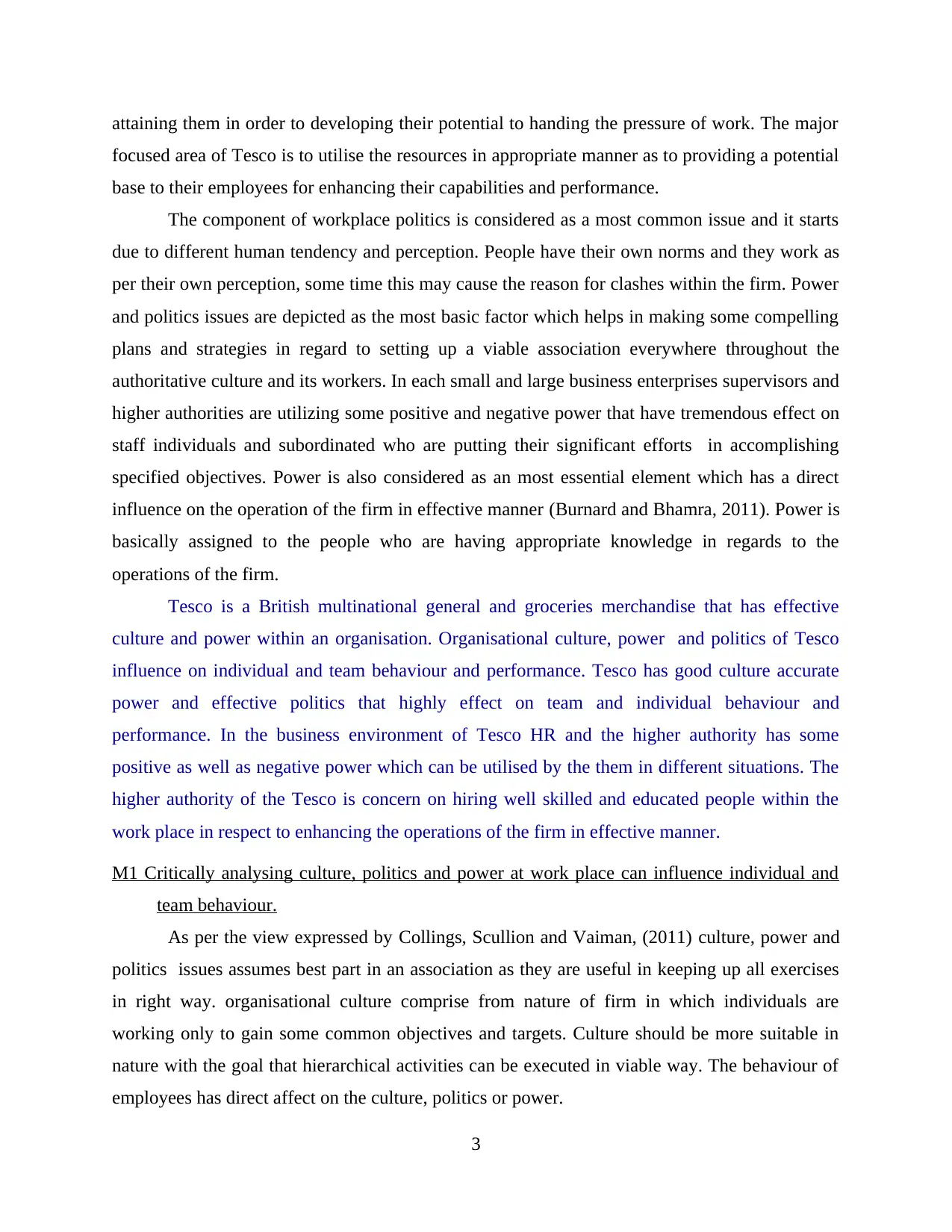
attaining them in order to developing their potential to handing the pressure of work. The major
focused area of Tesco is to utilise the resources in appropriate manner as to providing a potential
base to their employees for enhancing their capabilities and performance.
The component of workplace politics is considered as a most common issue and it starts
due to different human tendency and perception. People have their own norms and they work as
per their own perception, some time this may cause the reason for clashes within the firm. Power
and politics issues are depicted as the most basic factor which helps in making some compelling
plans and strategies in regard to setting up a viable association everywhere throughout the
authoritative culture and its workers. In each small and large business enterprises supervisors and
higher authorities are utilizing some positive and negative power that have tremendous effect on
staff individuals and subordinated who are putting their significant efforts in accomplishing
specified objectives. Power is also considered as an most essential element which has a direct
influence on the operation of the firm in effective manner (Burnard and Bhamra, 2011). Power is
basically assigned to the people who are having appropriate knowledge in regards to the
operations of the firm.
Tesco is a British multinational general and groceries merchandise that has effective
culture and power within an organisation. Organisational culture, power and politics of Tesco
influence on individual and team behaviour and performance. Tesco has good culture accurate
power and effective politics that highly effect on team and individual behaviour and
performance. In the business environment of Tesco HR and the higher authority has some
positive as well as negative power which can be utilised by the them in different situations. The
higher authority of the Tesco is concern on hiring well skilled and educated people within the
work place in respect to enhancing the operations of the firm in effective manner.
M1 Critically analysing culture, politics and power at work place can influence individual and
team behaviour.
As per the view expressed by Collings, Scullion and Vaiman, (2011) culture, power and
politics issues assumes best part in an association as they are useful in keeping up all exercises
in right way. organisational culture comprise from nature of firm in which individuals are
working only to gain some common objectives and targets. Culture should be more suitable in
nature with the goal that hierarchical activities can be executed in viable way. The behaviour of
employees has direct affect on the culture, politics or power.
3
focused area of Tesco is to utilise the resources in appropriate manner as to providing a potential
base to their employees for enhancing their capabilities and performance.
The component of workplace politics is considered as a most common issue and it starts
due to different human tendency and perception. People have their own norms and they work as
per their own perception, some time this may cause the reason for clashes within the firm. Power
and politics issues are depicted as the most basic factor which helps in making some compelling
plans and strategies in regard to setting up a viable association everywhere throughout the
authoritative culture and its workers. In each small and large business enterprises supervisors and
higher authorities are utilizing some positive and negative power that have tremendous effect on
staff individuals and subordinated who are putting their significant efforts in accomplishing
specified objectives. Power is also considered as an most essential element which has a direct
influence on the operation of the firm in effective manner (Burnard and Bhamra, 2011). Power is
basically assigned to the people who are having appropriate knowledge in regards to the
operations of the firm.
Tesco is a British multinational general and groceries merchandise that has effective
culture and power within an organisation. Organisational culture, power and politics of Tesco
influence on individual and team behaviour and performance. Tesco has good culture accurate
power and effective politics that highly effect on team and individual behaviour and
performance. In the business environment of Tesco HR and the higher authority has some
positive as well as negative power which can be utilised by the them in different situations. The
higher authority of the Tesco is concern on hiring well skilled and educated people within the
work place in respect to enhancing the operations of the firm in effective manner.
M1 Critically analysing culture, politics and power at work place can influence individual and
team behaviour.
As per the view expressed by Collings, Scullion and Vaiman, (2011) culture, power and
politics issues assumes best part in an association as they are useful in keeping up all exercises
in right way. organisational culture comprise from nature of firm in which individuals are
working only to gain some common objectives and targets. Culture should be more suitable in
nature with the goal that hierarchical activities can be executed in viable way. The behaviour of
employees has direct affect on the culture, politics or power.
3
⊘ This is a preview!⊘
Do you want full access?
Subscribe today to unlock all pages.

Trusted by 1+ million students worldwide
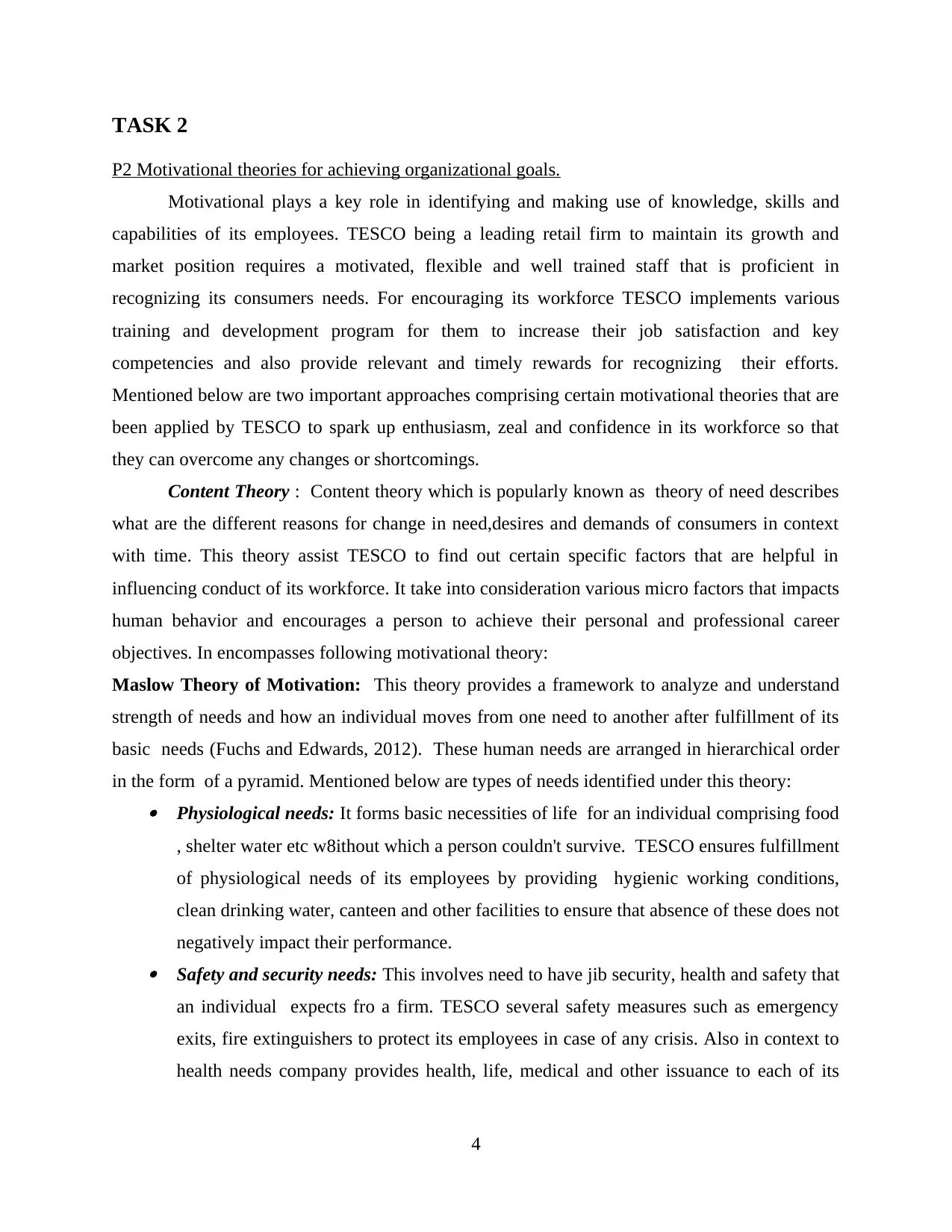
TASK 2
P2 Motivational theories for achieving organizational goals.
Motivational plays a key role in identifying and making use of knowledge, skills and
capabilities of its employees. TESCO being a leading retail firm to maintain its growth and
market position requires a motivated, flexible and well trained staff that is proficient in
recognizing its consumers needs. For encouraging its workforce TESCO implements various
training and development program for them to increase their job satisfaction and key
competencies and also provide relevant and timely rewards for recognizing their efforts.
Mentioned below are two important approaches comprising certain motivational theories that are
been applied by TESCO to spark up enthusiasm, zeal and confidence in its workforce so that
they can overcome any changes or shortcomings.
Content Theory : Content theory which is popularly known as theory of need describes
what are the different reasons for change in need,desires and demands of consumers in context
with time. This theory assist TESCO to find out certain specific factors that are helpful in
influencing conduct of its workforce. It take into consideration various micro factors that impacts
human behavior and encourages a person to achieve their personal and professional career
objectives. In encompasses following motivational theory:
Maslow Theory of Motivation: This theory provides a framework to analyze and understand
strength of needs and how an individual moves from one need to another after fulfillment of its
basic needs (Fuchs and Edwards, 2012). These human needs are arranged in hierarchical order
in the form of a pyramid. Mentioned below are types of needs identified under this theory: Physiological needs: It forms basic necessities of life for an individual comprising food
, shelter water etc w8ithout which a person couldn't survive. TESCO ensures fulfillment
of physiological needs of its employees by providing hygienic working conditions,
clean drinking water, canteen and other facilities to ensure that absence of these does not
negatively impact their performance. Safety and security needs: This involves need to have jib security, health and safety that
an individual expects fro a firm. TESCO several safety measures such as emergency
exits, fire extinguishers to protect its employees in case of any crisis. Also in context to
health needs company provides health, life, medical and other issuance to each of its
4
P2 Motivational theories for achieving organizational goals.
Motivational plays a key role in identifying and making use of knowledge, skills and
capabilities of its employees. TESCO being a leading retail firm to maintain its growth and
market position requires a motivated, flexible and well trained staff that is proficient in
recognizing its consumers needs. For encouraging its workforce TESCO implements various
training and development program for them to increase their job satisfaction and key
competencies and also provide relevant and timely rewards for recognizing their efforts.
Mentioned below are two important approaches comprising certain motivational theories that are
been applied by TESCO to spark up enthusiasm, zeal and confidence in its workforce so that
they can overcome any changes or shortcomings.
Content Theory : Content theory which is popularly known as theory of need describes
what are the different reasons for change in need,desires and demands of consumers in context
with time. This theory assist TESCO to find out certain specific factors that are helpful in
influencing conduct of its workforce. It take into consideration various micro factors that impacts
human behavior and encourages a person to achieve their personal and professional career
objectives. In encompasses following motivational theory:
Maslow Theory of Motivation: This theory provides a framework to analyze and understand
strength of needs and how an individual moves from one need to another after fulfillment of its
basic needs (Fuchs and Edwards, 2012). These human needs are arranged in hierarchical order
in the form of a pyramid. Mentioned below are types of needs identified under this theory: Physiological needs: It forms basic necessities of life for an individual comprising food
, shelter water etc w8ithout which a person couldn't survive. TESCO ensures fulfillment
of physiological needs of its employees by providing hygienic working conditions,
clean drinking water, canteen and other facilities to ensure that absence of these does not
negatively impact their performance. Safety and security needs: This involves need to have jib security, health and safety that
an individual expects fro a firm. TESCO several safety measures such as emergency
exits, fire extinguishers to protect its employees in case of any crisis. Also in context to
health needs company provides health, life, medical and other issuance to each of its
4
Paraphrase This Document
Need a fresh take? Get an instant paraphrase of this document with our AI Paraphraser
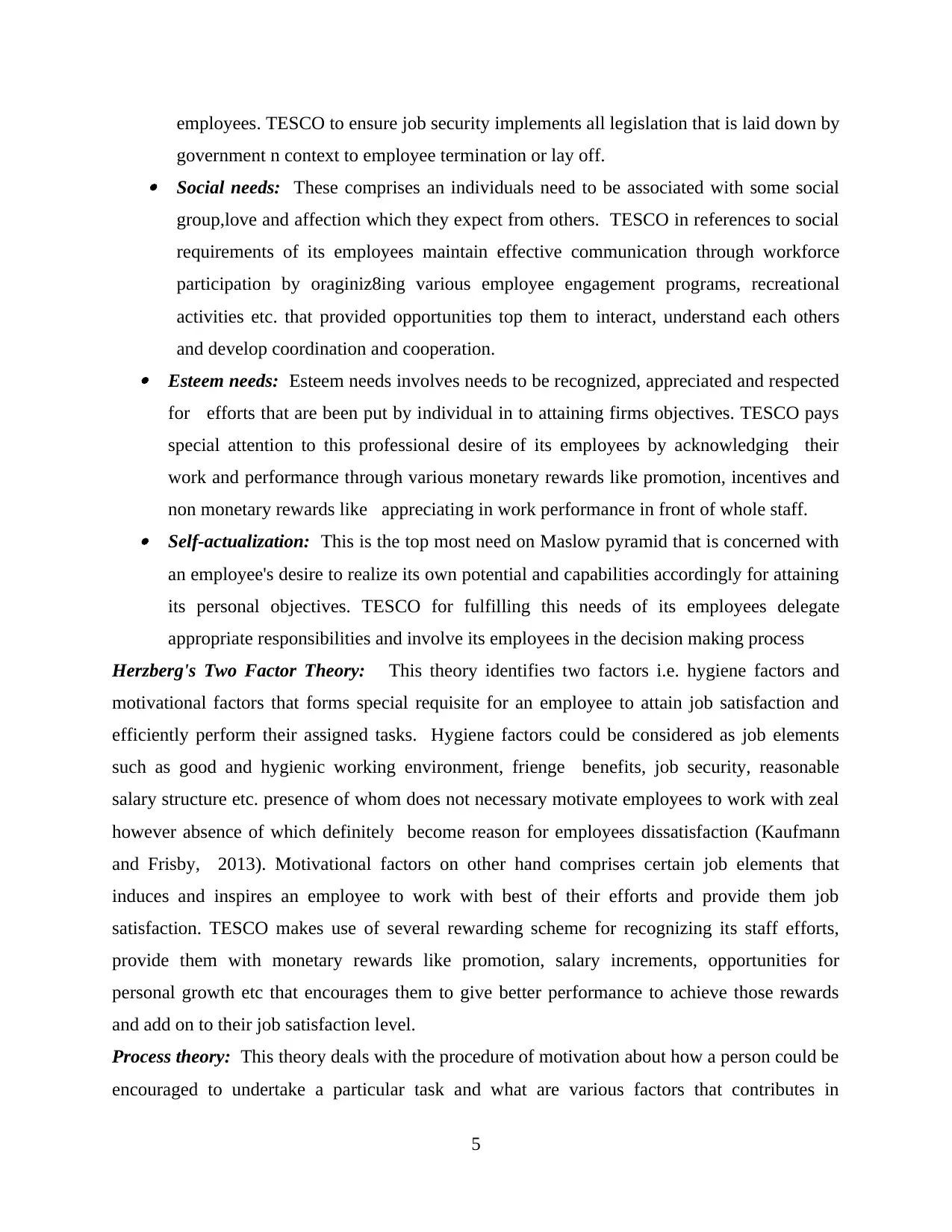
employees. TESCO to ensure job security implements all legislation that is laid down by
government n context to employee termination or lay off. Social needs: These comprises an individuals need to be associated with some social
group,love and affection which they expect from others. TESCO in references to social
requirements of its employees maintain effective communication through workforce
participation by oraginiz8ing various employee engagement programs, recreational
activities etc. that provided opportunities top them to interact, understand each others
and develop coordination and cooperation. Esteem needs: Esteem needs involves needs to be recognized, appreciated and respected
for efforts that are been put by individual in to attaining firms objectives. TESCO pays
special attention to this professional desire of its employees by acknowledging their
work and performance through various monetary rewards like promotion, incentives and
non monetary rewards like appreciating in work performance in front of whole staff. Self-actualization: This is the top most need on Maslow pyramid that is concerned with
an employee's desire to realize its own potential and capabilities accordingly for attaining
its personal objectives. TESCO for fulfilling this needs of its employees delegate
appropriate responsibilities and involve its employees in the decision making process
Herzberg's Two Factor Theory: This theory identifies two factors i.e. hygiene factors and
motivational factors that forms special requisite for an employee to attain job satisfaction and
efficiently perform their assigned tasks. Hygiene factors could be considered as job elements
such as good and hygienic working environment, frienge benefits, job security, reasonable
salary structure etc. presence of whom does not necessary motivate employees to work with zeal
however absence of which definitely become reason for employees dissatisfaction (Kaufmann
and Frisby, 2013). Motivational factors on other hand comprises certain job elements that
induces and inspires an employee to work with best of their efforts and provide them job
satisfaction. TESCO makes use of several rewarding scheme for recognizing its staff efforts,
provide them with monetary rewards like promotion, salary increments, opportunities for
personal growth etc that encourages them to give better performance to achieve those rewards
and add on to their job satisfaction level.
Process theory: This theory deals with the procedure of motivation about how a person could be
encouraged to undertake a particular task and what are various factors that contributes in
5
government n context to employee termination or lay off. Social needs: These comprises an individuals need to be associated with some social
group,love and affection which they expect from others. TESCO in references to social
requirements of its employees maintain effective communication through workforce
participation by oraginiz8ing various employee engagement programs, recreational
activities etc. that provided opportunities top them to interact, understand each others
and develop coordination and cooperation. Esteem needs: Esteem needs involves needs to be recognized, appreciated and respected
for efforts that are been put by individual in to attaining firms objectives. TESCO pays
special attention to this professional desire of its employees by acknowledging their
work and performance through various monetary rewards like promotion, incentives and
non monetary rewards like appreciating in work performance in front of whole staff. Self-actualization: This is the top most need on Maslow pyramid that is concerned with
an employee's desire to realize its own potential and capabilities accordingly for attaining
its personal objectives. TESCO for fulfilling this needs of its employees delegate
appropriate responsibilities and involve its employees in the decision making process
Herzberg's Two Factor Theory: This theory identifies two factors i.e. hygiene factors and
motivational factors that forms special requisite for an employee to attain job satisfaction and
efficiently perform their assigned tasks. Hygiene factors could be considered as job elements
such as good and hygienic working environment, frienge benefits, job security, reasonable
salary structure etc. presence of whom does not necessary motivate employees to work with zeal
however absence of which definitely become reason for employees dissatisfaction (Kaufmann
and Frisby, 2013). Motivational factors on other hand comprises certain job elements that
induces and inspires an employee to work with best of their efforts and provide them job
satisfaction. TESCO makes use of several rewarding scheme for recognizing its staff efforts,
provide them with monetary rewards like promotion, salary increments, opportunities for
personal growth etc that encourages them to give better performance to achieve those rewards
and add on to their job satisfaction level.
Process theory: This theory deals with the procedure of motivation about how a person could be
encouraged to undertake a particular task and what are various factors that contributes in
5
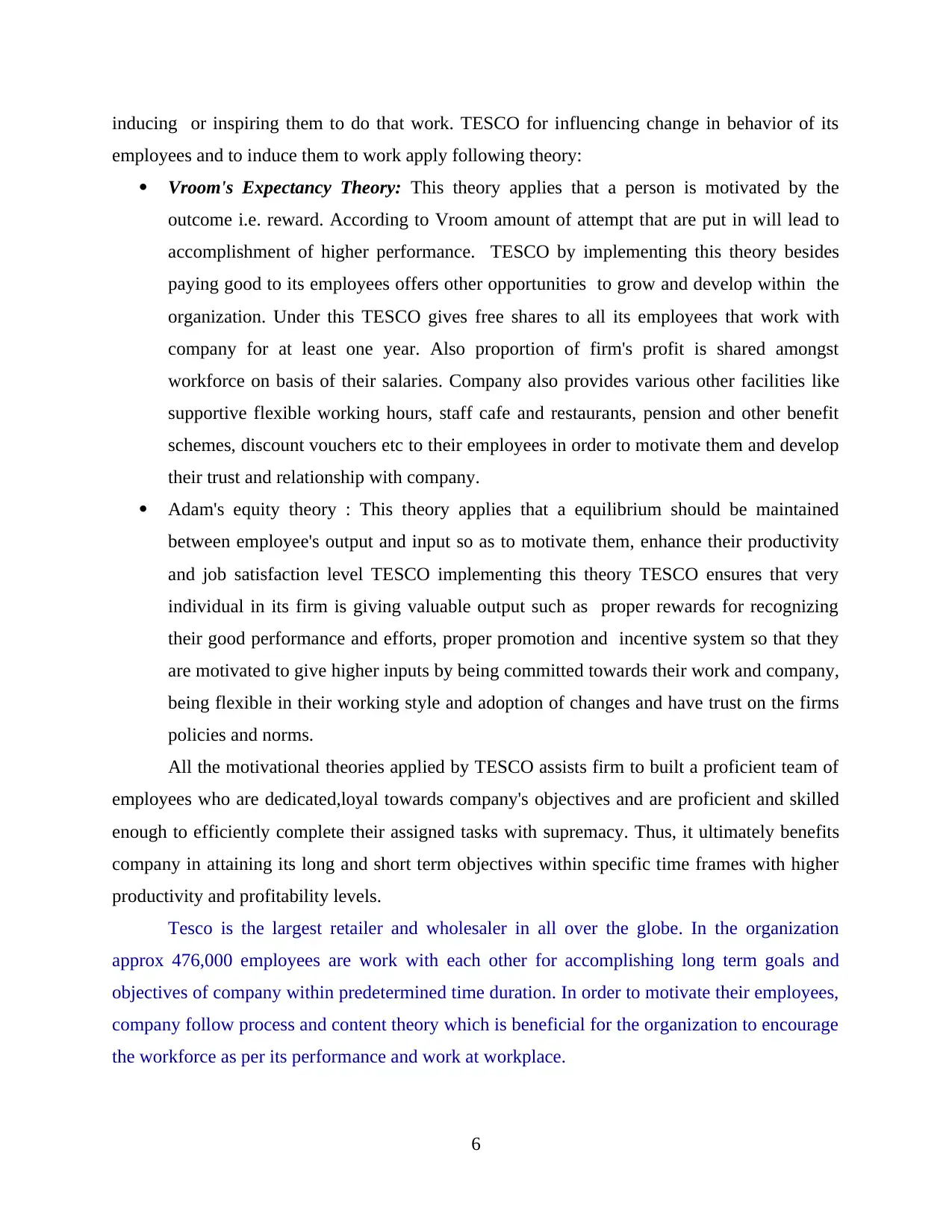
inducing or inspiring them to do that work. TESCO for influencing change in behavior of its
employees and to induce them to work apply following theory:
Vroom's Expectancy Theory: This theory applies that a person is motivated by the
outcome i.e. reward. According to Vroom amount of attempt that are put in will lead to
accomplishment of higher performance. TESCO by implementing this theory besides
paying good to its employees offers other opportunities to grow and develop within the
organization. Under this TESCO gives free shares to all its employees that work with
company for at least one year. Also proportion of firm's profit is shared amongst
workforce on basis of their salaries. Company also provides various other facilities like
supportive flexible working hours, staff cafe and restaurants, pension and other benefit
schemes, discount vouchers etc to their employees in order to motivate them and develop
their trust and relationship with company.
Adam's equity theory : This theory applies that a equilibrium should be maintained
between employee's output and input so as to motivate them, enhance their productivity
and job satisfaction level TESCO implementing this theory TESCO ensures that very
individual in its firm is giving valuable output such as proper rewards for recognizing
their good performance and efforts, proper promotion and incentive system so that they
are motivated to give higher inputs by being committed towards their work and company,
being flexible in their working style and adoption of changes and have trust on the firms
policies and norms.
All the motivational theories applied by TESCO assists firm to built a proficient team of
employees who are dedicated,loyal towards company's objectives and are proficient and skilled
enough to efficiently complete their assigned tasks with supremacy. Thus, it ultimately benefits
company in attaining its long and short term objectives within specific time frames with higher
productivity and profitability levels.
Tesco is the largest retailer and wholesaler in all over the globe. In the organization
approx 476,000 employees are work with each other for accomplishing long term goals and
objectives of company within predetermined time duration. In order to motivate their employees,
company follow process and content theory which is beneficial for the organization to encourage
the workforce as per its performance and work at workplace.
6
employees and to induce them to work apply following theory:
Vroom's Expectancy Theory: This theory applies that a person is motivated by the
outcome i.e. reward. According to Vroom amount of attempt that are put in will lead to
accomplishment of higher performance. TESCO by implementing this theory besides
paying good to its employees offers other opportunities to grow and develop within the
organization. Under this TESCO gives free shares to all its employees that work with
company for at least one year. Also proportion of firm's profit is shared amongst
workforce on basis of their salaries. Company also provides various other facilities like
supportive flexible working hours, staff cafe and restaurants, pension and other benefit
schemes, discount vouchers etc to their employees in order to motivate them and develop
their trust and relationship with company.
Adam's equity theory : This theory applies that a equilibrium should be maintained
between employee's output and input so as to motivate them, enhance their productivity
and job satisfaction level TESCO implementing this theory TESCO ensures that very
individual in its firm is giving valuable output such as proper rewards for recognizing
their good performance and efforts, proper promotion and incentive system so that they
are motivated to give higher inputs by being committed towards their work and company,
being flexible in their working style and adoption of changes and have trust on the firms
policies and norms.
All the motivational theories applied by TESCO assists firm to built a proficient team of
employees who are dedicated,loyal towards company's objectives and are proficient and skilled
enough to efficiently complete their assigned tasks with supremacy. Thus, it ultimately benefits
company in attaining its long and short term objectives within specific time frames with higher
productivity and profitability levels.
Tesco is the largest retailer and wholesaler in all over the globe. In the organization
approx 476,000 employees are work with each other for accomplishing long term goals and
objectives of company within predetermined time duration. In order to motivate their employees,
company follow process and content theory which is beneficial for the organization to encourage
the workforce as per its performance and work at workplace.
6
⊘ This is a preview!⊘
Do you want full access?
Subscribe today to unlock all pages.

Trusted by 1+ million students worldwide
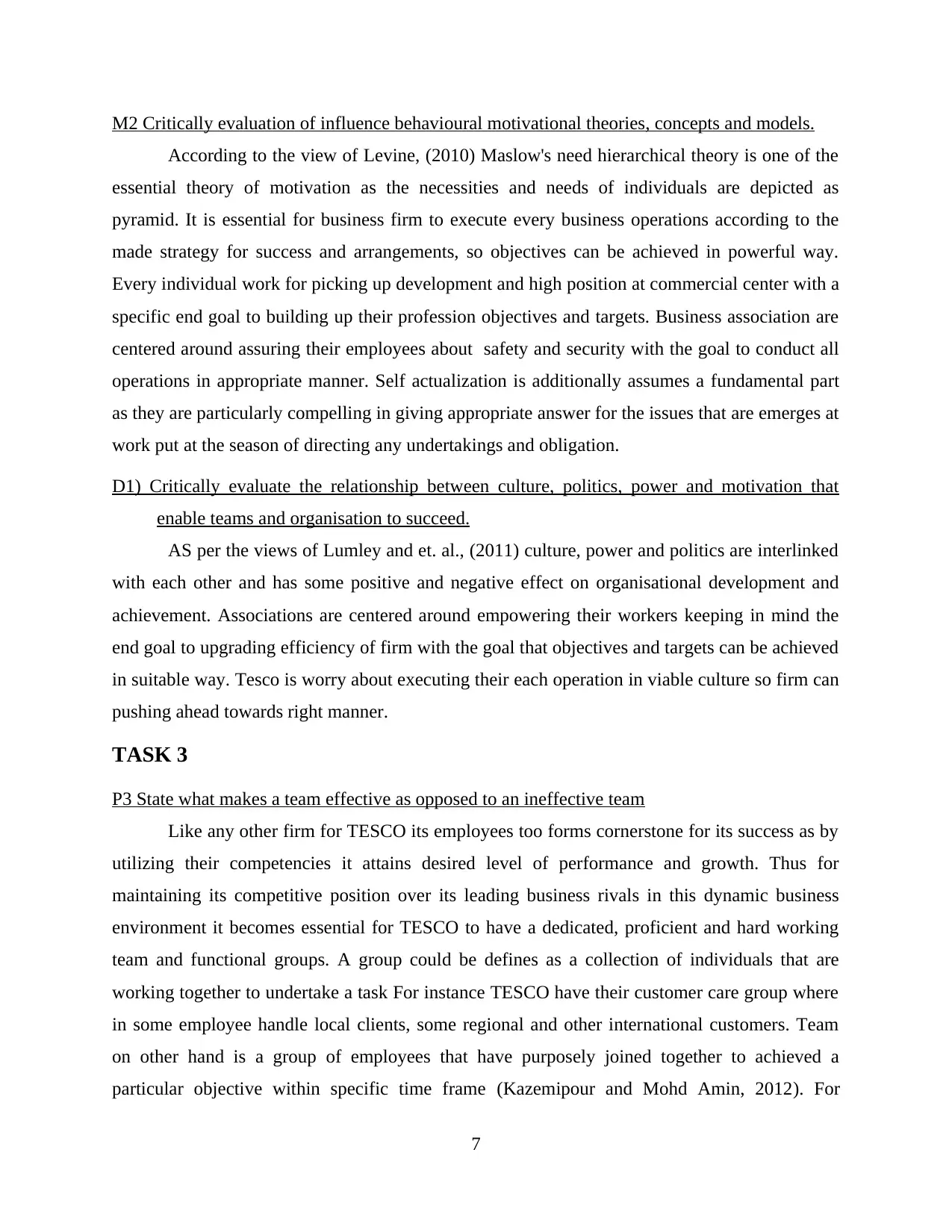
M2 Critically evaluation of influence behavioural motivational theories, concepts and models.
According to the view of Levine, (2010) Maslow's need hierarchical theory is one of the
essential theory of motivation as the necessities and needs of individuals are depicted as
pyramid. It is essential for business firm to execute every business operations according to the
made strategy for success and arrangements, so objectives can be achieved in powerful way.
Every individual work for picking up development and high position at commercial center with a
specific end goal to building up their profession objectives and targets. Business association are
centered around assuring their employees about safety and security with the goal to conduct all
operations in appropriate manner. Self actualization is additionally assumes a fundamental part
as they are particularly compelling in giving appropriate answer for the issues that are emerges at
work put at the season of directing any undertakings and obligation.
D1) Critically evaluate the relationship between culture, politics, power and motivation that
enable teams and organisation to succeed.
AS per the views of Lumley and et. al., (2011) culture, power and politics are interlinked
with each other and has some positive and negative effect on organisational development and
achievement. Associations are centered around empowering their workers keeping in mind the
end goal to upgrading efficiency of firm with the goal that objectives and targets can be achieved
in suitable way. Tesco is worry about executing their each operation in viable culture so firm can
pushing ahead towards right manner.
TASK 3
P3 State what makes a team effective as opposed to an ineffective team
Like any other firm for TESCO its employees too forms cornerstone for its success as by
utilizing their competencies it attains desired level of performance and growth. Thus for
maintaining its competitive position over its leading business rivals in this dynamic business
environment it becomes essential for TESCO to have a dedicated, proficient and hard working
team and functional groups. A group could be defines as a collection of individuals that are
working together to undertake a task For instance TESCO have their customer care group where
in some employee handle local clients, some regional and other international customers. Team
on other hand is a group of employees that have purposely joined together to achieved a
particular objective within specific time frame (Kazemipour and Mohd Amin, 2012). For
7
According to the view of Levine, (2010) Maslow's need hierarchical theory is one of the
essential theory of motivation as the necessities and needs of individuals are depicted as
pyramid. It is essential for business firm to execute every business operations according to the
made strategy for success and arrangements, so objectives can be achieved in powerful way.
Every individual work for picking up development and high position at commercial center with a
specific end goal to building up their profession objectives and targets. Business association are
centered around assuring their employees about safety and security with the goal to conduct all
operations in appropriate manner. Self actualization is additionally assumes a fundamental part
as they are particularly compelling in giving appropriate answer for the issues that are emerges at
work put at the season of directing any undertakings and obligation.
D1) Critically evaluate the relationship between culture, politics, power and motivation that
enable teams and organisation to succeed.
AS per the views of Lumley and et. al., (2011) culture, power and politics are interlinked
with each other and has some positive and negative effect on organisational development and
achievement. Associations are centered around empowering their workers keeping in mind the
end goal to upgrading efficiency of firm with the goal that objectives and targets can be achieved
in suitable way. Tesco is worry about executing their each operation in viable culture so firm can
pushing ahead towards right manner.
TASK 3
P3 State what makes a team effective as opposed to an ineffective team
Like any other firm for TESCO its employees too forms cornerstone for its success as by
utilizing their competencies it attains desired level of performance and growth. Thus for
maintaining its competitive position over its leading business rivals in this dynamic business
environment it becomes essential for TESCO to have a dedicated, proficient and hard working
team and functional groups. A group could be defines as a collection of individuals that are
working together to undertake a task For instance TESCO have their customer care group where
in some employee handle local clients, some regional and other international customers. Team
on other hand is a group of employees that have purposely joined together to achieved a
particular objective within specific time frame (Kazemipour and Mohd Amin, 2012). For
7
Paraphrase This Document
Need a fresh take? Get an instant paraphrase of this document with our AI Paraphraser
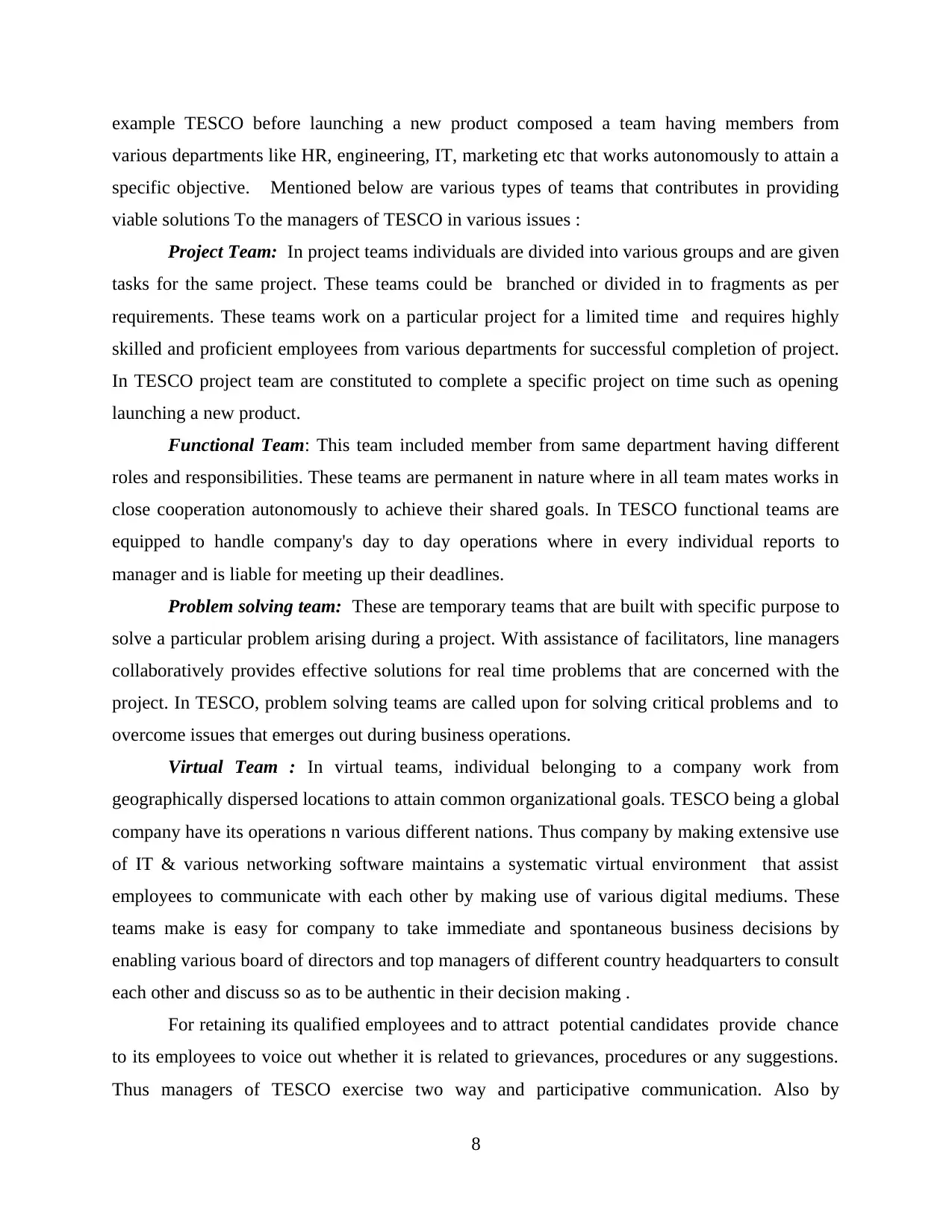
example TESCO before launching a new product composed a team having members from
various departments like HR, engineering, IT, marketing etc that works autonomously to attain a
specific objective. Mentioned below are various types of teams that contributes in providing
viable solutions To the managers of TESCO in various issues :
Project Team: In project teams individuals are divided into various groups and are given
tasks for the same project. These teams could be branched or divided in to fragments as per
requirements. These teams work on a particular project for a limited time and requires highly
skilled and proficient employees from various departments for successful completion of project.
In TESCO project team are constituted to complete a specific project on time such as opening
launching a new product.
Functional Team: This team included member from same department having different
roles and responsibilities. These teams are permanent in nature where in all team mates works in
close cooperation autonomously to achieve their shared goals. In TESCO functional teams are
equipped to handle company's day to day operations where in every individual reports to
manager and is liable for meeting up their deadlines.
Problem solving team: These are temporary teams that are built with specific purpose to
solve a particular problem arising during a project. With assistance of facilitators, line managers
collaboratively provides effective solutions for real time problems that are concerned with the
project. In TESCO, problem solving teams are called upon for solving critical problems and to
overcome issues that emerges out during business operations.
Virtual Team : In virtual teams, individual belonging to a company work from
geographically dispersed locations to attain common organizational goals. TESCO being a global
company have its operations n various different nations. Thus company by making extensive use
of IT & various networking software maintains a systematic virtual environment that assist
employees to communicate with each other by making use of various digital mediums. These
teams make is easy for company to take immediate and spontaneous business decisions by
enabling various board of directors and top managers of different country headquarters to consult
each other and discuss so as to be authentic in their decision making .
For retaining its qualified employees and to attract potential candidates provide chance
to its employees to voice out whether it is related to grievances, procedures or any suggestions.
Thus managers of TESCO exercise two way and participative communication. Also by
8
various departments like HR, engineering, IT, marketing etc that works autonomously to attain a
specific objective. Mentioned below are various types of teams that contributes in providing
viable solutions To the managers of TESCO in various issues :
Project Team: In project teams individuals are divided into various groups and are given
tasks for the same project. These teams could be branched or divided in to fragments as per
requirements. These teams work on a particular project for a limited time and requires highly
skilled and proficient employees from various departments for successful completion of project.
In TESCO project team are constituted to complete a specific project on time such as opening
launching a new product.
Functional Team: This team included member from same department having different
roles and responsibilities. These teams are permanent in nature where in all team mates works in
close cooperation autonomously to achieve their shared goals. In TESCO functional teams are
equipped to handle company's day to day operations where in every individual reports to
manager and is liable for meeting up their deadlines.
Problem solving team: These are temporary teams that are built with specific purpose to
solve a particular problem arising during a project. With assistance of facilitators, line managers
collaboratively provides effective solutions for real time problems that are concerned with the
project. In TESCO, problem solving teams are called upon for solving critical problems and to
overcome issues that emerges out during business operations.
Virtual Team : In virtual teams, individual belonging to a company work from
geographically dispersed locations to attain common organizational goals. TESCO being a global
company have its operations n various different nations. Thus company by making extensive use
of IT & various networking software maintains a systematic virtual environment that assist
employees to communicate with each other by making use of various digital mediums. These
teams make is easy for company to take immediate and spontaneous business decisions by
enabling various board of directors and top managers of different country headquarters to consult
each other and discuss so as to be authentic in their decision making .
For retaining its qualified employees and to attract potential candidates provide chance
to its employees to voice out whether it is related to grievances, procedures or any suggestions.
Thus managers of TESCO exercise two way and participative communication. Also by
8
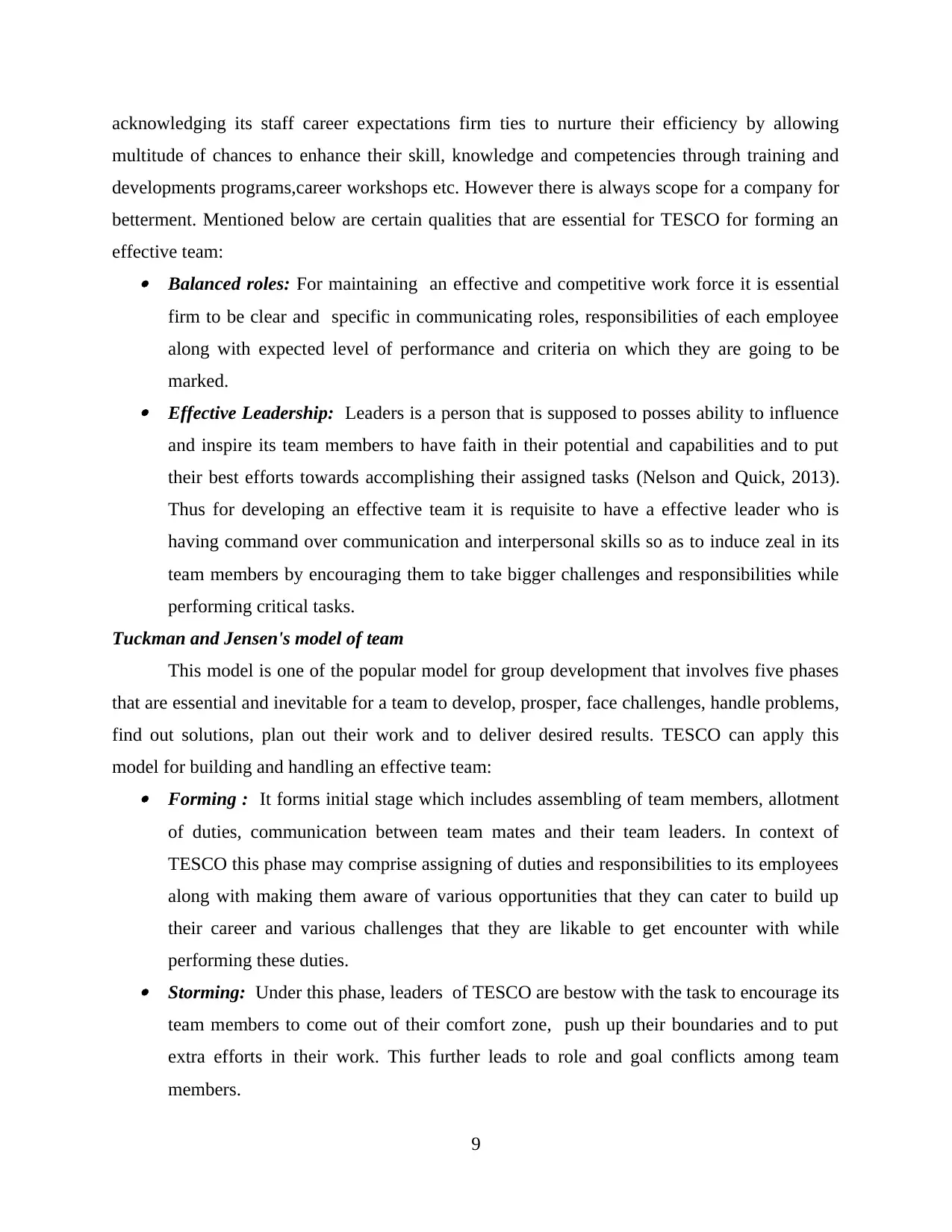
acknowledging its staff career expectations firm ties to nurture their efficiency by allowing
multitude of chances to enhance their skill, knowledge and competencies through training and
developments programs,career workshops etc. However there is always scope for a company for
betterment. Mentioned below are certain qualities that are essential for TESCO for forming an
effective team: Balanced roles: For maintaining an effective and competitive work force it is essential
firm to be clear and specific in communicating roles, responsibilities of each employee
along with expected level of performance and criteria on which they are going to be
marked. Effective Leadership: Leaders is a person that is supposed to posses ability to influence
and inspire its team members to have faith in their potential and capabilities and to put
their best efforts towards accomplishing their assigned tasks (Nelson and Quick, 2013).
Thus for developing an effective team it is requisite to have a effective leader who is
having command over communication and interpersonal skills so as to induce zeal in its
team members by encouraging them to take bigger challenges and responsibilities while
performing critical tasks.
Tuckman and Jensen's model of team
This model is one of the popular model for group development that involves five phases
that are essential and inevitable for a team to develop, prosper, face challenges, handle problems,
find out solutions, plan out their work and to deliver desired results. TESCO can apply this
model for building and handling an effective team: Forming : It forms initial stage which includes assembling of team members, allotment
of duties, communication between team mates and their team leaders. In context of
TESCO this phase may comprise assigning of duties and responsibilities to its employees
along with making them aware of various opportunities that they can cater to build up
their career and various challenges that they are likable to get encounter with while
performing these duties. Storming: Under this phase, leaders of TESCO are bestow with the task to encourage its
team members to come out of their comfort zone, push up their boundaries and to put
extra efforts in their work. This further leads to role and goal conflicts among team
members.
9
multitude of chances to enhance their skill, knowledge and competencies through training and
developments programs,career workshops etc. However there is always scope for a company for
betterment. Mentioned below are certain qualities that are essential for TESCO for forming an
effective team: Balanced roles: For maintaining an effective and competitive work force it is essential
firm to be clear and specific in communicating roles, responsibilities of each employee
along with expected level of performance and criteria on which they are going to be
marked. Effective Leadership: Leaders is a person that is supposed to posses ability to influence
and inspire its team members to have faith in their potential and capabilities and to put
their best efforts towards accomplishing their assigned tasks (Nelson and Quick, 2013).
Thus for developing an effective team it is requisite to have a effective leader who is
having command over communication and interpersonal skills so as to induce zeal in its
team members by encouraging them to take bigger challenges and responsibilities while
performing critical tasks.
Tuckman and Jensen's model of team
This model is one of the popular model for group development that involves five phases
that are essential and inevitable for a team to develop, prosper, face challenges, handle problems,
find out solutions, plan out their work and to deliver desired results. TESCO can apply this
model for building and handling an effective team: Forming : It forms initial stage which includes assembling of team members, allotment
of duties, communication between team mates and their team leaders. In context of
TESCO this phase may comprise assigning of duties and responsibilities to its employees
along with making them aware of various opportunities that they can cater to build up
their career and various challenges that they are likable to get encounter with while
performing these duties. Storming: Under this phase, leaders of TESCO are bestow with the task to encourage its
team members to come out of their comfort zone, push up their boundaries and to put
extra efforts in their work. This further leads to role and goal conflicts among team
members.
9
⊘ This is a preview!⊘
Do you want full access?
Subscribe today to unlock all pages.

Trusted by 1+ million students worldwide
1 out of 18
Related Documents
Your All-in-One AI-Powered Toolkit for Academic Success.
+13062052269
info@desklib.com
Available 24*7 on WhatsApp / Email
![[object Object]](/_next/static/media/star-bottom.7253800d.svg)
Unlock your academic potential
Copyright © 2020–2026 A2Z Services. All Rights Reserved. Developed and managed by ZUCOL.




